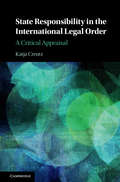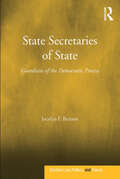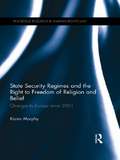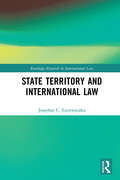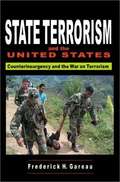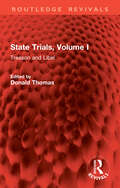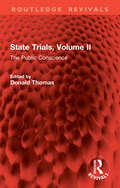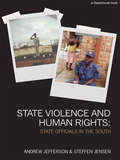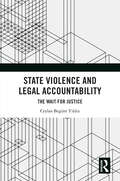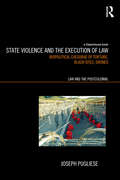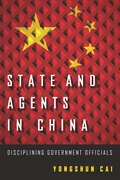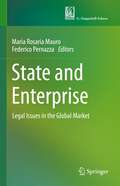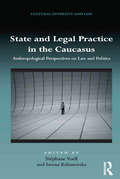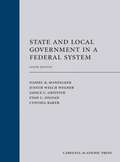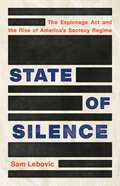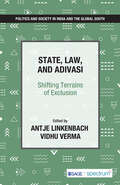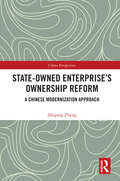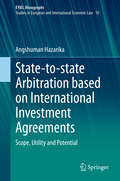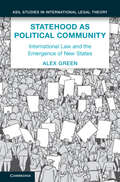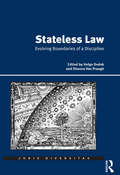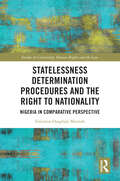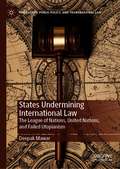- Table View
- List View
State Responsibility in the International Legal Order: A Critical Appraisal
by Katja CreutzState responsibility in international law is considered one of the cornerstones of the field. For a long time it remained the exclusive responsibility system due to the primacy of States as subjects of international law. Its unique position has nonetheless been challenged by several developments both within and outside the international legal order, such as the rise of alternative responsibility ideas and practices, as well as globalization and its consequences. This book adopts a critical and holistic approach to the law of State responsibility and analyzes the functionality of the general rules of State responsibility in a changed international landscape characterized by the fragmentation of responsibility. It is argued that State responsibility is not equally relevant across the broad spectrum of international obligations, and that alternative constructions of responsibility, namely international criminal law and international liability, have increased in standing.
State Secretaries of State: Guardians of the Democratic Process (Election Law, Politics, And Theory Ser.)
by Jocelyn F. BensonNearly a decade after the 2000 Presidential elections invited a firestorm of questions about the sanctity of our democratic process, there continues to be a heightened interest in the role of state-wide elections officials, typically the state's Secretary of State - this book looks into their pivotal role in the promotion of a healthy democracy. Much past interest has resulted in overly critical coverage of election errors, ignoring the tireless efforts that ensure the American citizens benefit from a democratic, inclusive and accountable election process. Through a series of case studies, anecdotes, and interviews with current and recent secretaries, State Secretaries of State author Jocelyn Benson readdresses this balance by providing the first in-depth study of the Secretary's role in registering voters, enforcing voting laws and regulations, overseeing elections, and certifying results. As such, it represents a much-needed contribution to the study of US elections, both in practice and in law.
State Security Regimes and the Right to Freedom of Religion and Belief: Changes in Europe Since 2001 (Routledge Research in Human Rights Law)
by Karen MurphyThe question of to what extent, manifestations of religious beliefs should be permitted in the European public sphere has become a salient and controversial topic in recent years. Despite the increasing interest however, debates have rarely questioned the conventional wisdom that an increase in the range of security measures employed by a government inevitably leads to a decrease in the human rights enjoyed by individuals. This book analyses the relationship between state security regime changes and the right to religious freedom in the EU. It presents a comparative analysis of the impact these regime changes have had on the politics, policies and protections of religious freedom across the EU member states in the post-2001 environment. The book provides a timely investigation into the role of national legislation, the European Court of Human Rights, and societal trends in the protection of religious freedom, and in so doing demonstrates why the relationship between state security and religious freedom is one of the most socially significant challenges facing policymakers and jurists in Europe at the present time.
State Territory and International Law (Routledge Research in International Law)
by Josephat EzenwajiakuThis book proposes a re-interpretation of Article 2(4) of the Charter of the United Nations to read, or at least include, respect for the inviolability of State territory. While States purport to obey the prohibition of the Use of Force, they frequently engage in activities that could undermine international peace and security. In this book the author argues that State practice, opinio juris, as well as contentious and advisory opinions of the International Court of Justice, have promoted the first limb of Article 2(4). Although wars between States have decreased, the maintenance of international peace and security remains a mirage, as shown by the increase in intra- and inter-State conflicts across the world. The author seeks to initiate a rethinking of the provision of Article 2(4), which the International Court of Justice has described as the cornerstone of the United Nations. The author argues that the time is ripe for States to embrace an evolutive interpretation of Article 2(4) to mean respect, as opposed to the traditional view of the threat, or the use, of force. He also evaluates the discourse regarding territorial jurisdiction in cyberspace and argues that the efforts made by the international community to apply Article 2(4) to cyberspace suggest that the article is a flexible and live instrument that should be adjusted to address the circumstances that endanger international peace and security. This book will engineer a serious debate regarding the scope of Article 2(4), which before now has always been limited to the threat or use of force. As a result, it will be of interest to academics and students of public international law, as well as diplomats and policymakers.
State Terrorism and the United States: From Counterinsurgency to the War on Terrorism
by Frederick H. GareauAn analysis of America's involvement in training of foreign military.
State Trials, Volume I: Treason and Libel (Routledge Revivals)
by Donald ThomasState Trials, Volume I (first published in 1972) contains cases concerned with treason and the freedom of press gathered from the full edition of State Trials completed in 1826. The author has selected some of the most interesting and important trials for this volume.The book includes a general introduction, explaining the significance of State Trials as a whole. Each selected case is then introduced by a short essay, which explains the events surrounding the trial and its importance in relation to legal history. State Trials will always be one of the most vivid and fascinating accounts of English life in all documentary literature. Tales of murder, treason, bigamy, adultery, political conspiracy, the scandals of the prison system, and the brutality of imperial conquest are told through the words of the great and the humble. Murderers, pornographers, conquerors, and heroes, all come alive in their own words. This book will be a fascinating read for students and researchers of law and history, and general readers interested in the topic.
State Trials, Volume II: The Public Conscience (Routledge Revivals)
by Donald ThomasState Trials, Volume II (first published in 1972) contains cases concerned with witchcraft, the scandals of the prisons, and colonial administration gathered from the full edition of State Trials completed in 1826. The author has selected some of the most interesting and important trials for this volume.The book includes a general introduction, explaining the significance of State Trials as a whole. Each selected case is then introduced by a short essay, which explains the events surrounding the trial and its importance in relation to legal history. State Trials will always be one of the most vivid and fascinating accounts of English life in all documentary literature. Tales of murder, treason, bigamy, adultery, political conspiracy, the scandals of the prison system, and the brutality of imperial conquest are told through the words of the great and the humble. Murderers, pornographers, conquerors, and heroes, all come alive in their own words. This book will be a fascinating read for students and researchers of law and history, and general readers interested in the topic.
State Violence and Human Rights: State Officials in the South (Law, Development and Globalization)
by Andrew M. Jefferson Steffen JensenState Violence and Human Rights addresses how legal practices – rooted in global human rights discourse or local demands – take hold in societies where issues of state violence remain to be resolved. Attempts to make societies accountable to human rights norms regularly draw on international legal conventions governing state conduct. As such, interventions tend to be based on inherently normative assumptions about conflict, justice, rights and law, and so often fail to take into consideration the reality of local circumstances, and in particular of state institutions and their structures of authority. Against the grain of these analyses, State Violence and Human Rights takes as its point of departure the fact that law and authority are contested. Grounded in the recognition that concepts of rights and legal practices are not fixed, the contributors to this volume address their contestation 'in situ'; as they focus on the everyday practices of state officials, non-state authorities and reformers. Addressing how state representatives – the police officer, the prison officer, the ex-combatant militia member, the hangman and the traditional leader – have to negotiate the tensions between international legal imperatives, the expectations of donors, the demands of institutions, as well as their own interests, this volume thus explores how legal discourses are translated from policy into everyday practice.
State Violence and Legal Accountability: The Wait for Justice
by Ceylan Begüm YıldızThis book pursues a critical perspective on the phenomenon of state violence and its legal unaccountability.Focusing on the role of myths, assumptions and ghosts that surround the meaning of the state and performance of state violence, this book details a fresh perspective on that violence and its legal unaccountability. It asks: How does our understanding of the state reflect on the political demands and legal processes of accountability? To pursue this question, the book traces the political and legal aftermath of the police killing of a 14-year-old boy, Berkin Elvan, during the nationwide Gezi protests of the summer of 2013 in Turkey. Countering imaginaries of the state clash between the state officer’s attempt to attribute personal responsibility to Elvan for his own death and public demands for state accountability. Meanwhile, the prolonged legal process ensures that subjects who seek accountability find themselves in a long and exhausting legal battle which dominates their lives and transforms their subjectivity. As the Elvan family continues to wait for accountability and justice, this book suggests that waiting and suspense are key elements of legal performance in trials concerning state violence. As such, and unlike the usual reading of legal violence, which focuses on judgement, the book explores how this violence – and its implications for an understanding of justice and accountability – is bound to the very act of waiting.This critical interdisciplinary study of state violence and its legal handling will appeal to scholars and students from a wider range of disciplines including law, criminology, politics, sociology and political and legal philosophy.
State Violence and the Execution of Law: Biopolitcal Caesurae of Torture, Black Sites, Drones (Law and the Postcolonial)
by Joseph PuglieseState Violence and the Execution of Law stages a provocative analysis of how the biopolitical divide between human and animal has played a fundamental role in enabling state violence, including torture, secret imprisonment and killing-at-a-distance via drones. Analyzing the complex ways in which the United States government deploys law in order to consolidate and further imperial relations of power, Pugliese tracks the networks that enable the diffusion and normalization of the state’s monopoly of violence both in the US and in an international context. He demonstrates how networks of state violence are embedded within key legal institutions, military apparatuses, civilian sites, corporations, carceral architectures, and advanced technologies. The author argues that the exercise of state violence, as unleashed by the war on terror, has enmeshed the subjects of the Global South within institutional and discursive structures that position them as non-human animals that can be tortured, killed and disappeared with impunity. Drawing on poststructuralist, critical race and whiteness, and critical legal theories, the book is transdisciplinary in its approach and value. It will be invaluable to university students and scholars in Critical Legal and Socio-Legal Studies, Cultural Studies, Race and Ethnicity Studies, International Politics, and Postcolonial Studies.
State and Agents in China: Disciplining Government Officials
by Yongshun CaiChinese government officials have played a crucial role in China's economic development, but they are also responsible for severe problems, including environmental pollution, violation of citizens' rights, failure in governance, and corruption. How does the Chinese Party-state respond when a government official commits a duty-related malfeasance or criminal activity? And how does it balance the potential political costs of disciplining its own agents versus the loss of legitimacy in tolerating their misdeeds? State and Agents in China explores how the party-state addresses this dilemma, uncovering the rationale behind the selective disciplining of government officials and its implications for governance in China. By examining the discipline of state agents, Cai shows how selective punishment becomes the means of balancing the need for and difficulties of disciplining agents, and explains why some erring agents are tolerated while others are punished. Cai finds that the effectiveness of punishing erring officials in China does not depend so much on the Party-state's capacity to detect and punish each erring official but on the threat it creates when the Party-state decides to mete out punishment. Importantly, the book also shows how relaxed discipline allows reform-minded officials to use rule-violating reform measures to address local problems, and how such reform measures have significant implications for the regime's resilience.
State and Enterprise: Legal Issues in the Global Market
by Federico Pernazza Maria Rosaria MauroThis book addresses the regulation of the State/Enterprise relationship in the framework of international economic context. It analyzes this relationship from the discrete perspectives of conflict, cooperation, and integration in contributions by authors representing a diverse range of legal cultures and political backgrounds.The topic is investigated following three approaches:• State versus Enterprise (the State which bans, restricts, or regulates the activities of Enterprises, both domestic and foreign);• Enterprise versus State (the Enterprises, main actors of commercial, industrial or financial initiatives, which may directly or indirectly affect the legal and economic structure of the State);• State as Enterprise and Enterprise as State (public Enterprises under political control that pursue geopolitical goals, and Enterprises that rely on the political, financial, and strategic support of the State for their business expansion).Furthermore, the volume includes a special focus on the relationship State/Enterprise in non-capitalist economies (China, Russia, and Cuba).
State and Legal Practice in the Caucasus: Anthropological Perspectives on Law and Politics (Cultural Diversity and Law)
by Stéphane Voell Iwona KaliszewskaLegal pluralism and the experience of the state in the Caucasus are at the centre of this edited volume. This is a region affected by a multitude of legal orders and the book describes social action and governance in the light of this, and considers how conceptions of order are enforced, used, followed and staged in social networks and legal practice. Principally, how is the state perceived and how does it perform in both the North and South Caucasus? From elections in Dagestan and Armenia to uses of traditional law in Ingushetia and Georgia, from repression of journalism in Azerbaijan to the narrations of anti-corruption campaigns in Georgia - the text reflects the multifarious uses and performances of law and order. The collection includes approaches from different scholarly traditions and their respective theoretical background and therefore forms a unique product of multinational encounters. The volume will be a valuable resource for legal and political anthropologists, ethnohistorians and researchers and academics working in the areas of post-socialism and post-colonialism.
State and Local Government in a Federal System
by Cynthia Baker Daniel Mandelker Judith Wegner Janice Griffith Evan ZoldanThe ninth edition of State and Local Government in a Federal System continues the tradition of comprehensive coverage, providing teachers with choices that are suitable to either two- or three-unit courses with emphasis on local or state government. Two new co-authors have been added. Chapter 2 (on state and local government powers) has been refreshed with a new overarching problem relating to short term rental and now addresses proposed changes in home rule provisions and state preemption practices proposed by the National League of Cities in 2020. Chapter 4 (on public finance) has been completely revised to update coverage concerning sources and strategies affecting government funding, borrowing, expenditures, federal oversight, and financially distressed municipalities in recent years. <p><p>All other aspects of the book have been thoroughly updated, including those relating to regional government, government employees, public education (funding and charter schools), federalism, the role of the state governors and legislatures, and more. This edition is particularly timely in that it integrates coverage of emerging legal issues relating to the COVID pandemic and devotes increased attention to social justice issues including possible implications for government liability.
State of Silence: The Espionage Act and the Rise of America's Secrecy Regime
by Sam LebovicAn "essential guide" (Beverly Gage, Pulitzer Prize–winning author of G-Man) to how the Espionage Act gave rise to a vast American security state that keeps citizens in the dark In State of Silence, political historian Sam Lebovic uncovers the troubling history of the Espionage Act. First passed in 1917, it was initially used to punish critics of World War I. Yet as Americans began to balk at the act&’s restrictions on political dissidents and the press, the government turned its focus toward keeping its secrets under wraps. The resulting system for classifying information is absurdly cautious, staggeringly costly, and shrouded in secrecy, preventing ordinary Americans from learning what their country is doing in their name, both at home and abroad. Shedding new light on the bloated governmental security apparatus that&’s weighing our democracy down, State of Silence offers the definitive history of America&’s turn toward secrecy—and its staggering human costs.
State, Law, and Adivasi: Shifting Terrains of Exclusion
by Vidhu Verma Antje LinkenbachThis volume presents an overview of the relationship between the state, law, and Adivasis that have experienced a profound political shift due to privatization of natural resources. It discusses the role of the corporates and its impact on livelihoods of the Adivasis in India. For the Indian state, a significant challenge is to establish a new normative framework for indigenous autonomy based on the values of equality and sustainability. This calls for recognition of the right to self-determination and exercise of collective rights of the Adivasis. The chapters in this volume examine: • 'Exclusion' as a useful framework for analyzing the various axes of inequality that affect the Adivasi communities • How state, development, and Adivasi politics play out in entangled ways in the social, political and legal domains • The interplay of and the deep tension between the promise of legal protection and the realities of inadequate implementation.
State-Owned Enterprise's Ownership Reform: A Chinese Modernization Approach (China Perspectives)
by Zhigang ZhengIn reviewing the new round of state-owned enterprise (SOE) reforms characterized by mixed ownership since 2013 in China, this book systematically investigates the theoretical underpinnings, model options and approaches to implementation of SOE mixed-ownership reforms. SOE reforms have functioned as an integral part of China’s transformation to a market-oriented economy. Responding to the changing economic context and negative repercussions of earlier SOE reforms launched in the late 1990s, SOE mixed-ownership reforms encourage the participation of different types of capital and sounder management mechanisms. The author first reviews the impetus behind SOE mixed-ownership reforms and discusses how modern property rights theory and decentralized control theory perform as the theoretical underpinnings of the reforms. Based on cases of many completed SOE mixed-ownership reforms, the book summarizes and assesses the feasible models and implementation details of the reforms. It also examines how the reforms have impacted state-owned assets as well as executives’ compensation and incentives, both of which run parallel to the core reforms surrounding ownership. The book will appeal to professional readers studying entrepreneurial theory, corporate governance, China’s SOE reforms and Chinese business and the economy, as well as investors and policy makers interested in the Chinese market and Chinese enterprise reform.
State-Owned Multinationals: Governments in Global Business (JIBS Special Collections)
by Alvaro Cuervo-CazurraThis book provides a deep understanding of state-owned multinationals (SOMNCs) and their role in global business. SOMNCs have emerged as a force to contend with in global competition, and their study connects several fields such as economics, political economy, international business and global strategy. This prestigious collection of articles presents insights into the interaction between government ownership and internationalization, and aims to provoke new research approaches and insights on the topic. The book includes some of the key contributions to our understanding of these firms and new commentaries explaining how to analyze them. This book is essential reading for academics and consultants looking to gain a clearer understanding of SOMNCs and how to research them.
State-to-state Arbitration based on International Investment Agreements: Scope, Utility and Potential (European Yearbook of International Economic Law #10)
by Angshuman HazarikaThis book discusses the use of the compromissory clause in international investment agreements (IIAs) for interstate dispute resolution. It puts forward the possibility of using state-to-state arbitration based on the compromissory clause in IIAs as an alternative means of resolving investment disputes in light of the global debate on the shortcomings of investor-state arbitration. The book’s main conclusion is that state-to-state arbitration may be used as an alternative to currently popular investor-state arbitration by resolving procedural hurdles which impede its acceptance. It becomes more important with the removal of investor-state arbitration as an option in certain recent IIAs, which then elevates state-to-state arbitration as the sole option for binding third party dispute resolution in the treaty. Even then, it is unlikely to replace investor-state arbitration completely due to its inherent shortcomings, such as the risk of re-politicising disputes and a lack of direct control over the process for the affected investors. Nevertheless, the availability of an alternative forum will benefit all parties involved, as they will no longer be wholly dependent on investor-state arbitration, which can be affected by events such as denunciation from the ICSID Convention or the refusal of a host state to enforce an arbitration award.
Statehood and Self-Determination
by Duncan FrenchThe concepts of statehood and self-determination provide the normative structure on which the international legal order is ultimately premised. As a system of law founded upon the issue of territorial control, ascertaining and determining which entities are entitled to the privileges of statehood continues to be one of the most difficult and complex issues. Moreover, although the process of decolonisation is almost complete, the principle of self-determination has raised new challenges for the metropolitan territories of established states, including the extent to which 'internal' self-determination guarantees additional rights for minority and other groups. As the controversies surrounding remedial secession have revealed, the territorial integrity of a state can be questioned if there are serious and persistent breaches of a people's human rights. This volume brings together such debates to reflect further on the current state of international law regarding these fundamental issues.
Statehood as Political Community: International Law and the Emergence of New States (ASIL Studies in International Legal Theory)
by Alex GreenAlex Green argues that states arise under contemporary international law only when two abstract conditions are fulfilled. First, emerging states must constitute 'genuine political communities': collectives within which particular kinds of ethically valuable behaviour are possible. Second, such communities must emerge in a manner consistent with the ethical importance of individual political action. This uniquely 'Grotian' theory of state creation provides a clear legal framework comprising four factual 'antecedents' and five procedural principles, rendering the law of statehood both coherent and normatively attractive.
Stateless Commerce: The Diamond Network and the Persistence of Relational Exchange
by Barak D. RichmanHow does Manhattan’s 47th Street diamond district thrive as an ethnic marketplace without lawyers, courts, and state coercion? Barak Richman draws on insider interviews to show why relational exchange based on familiarity, trust, and community enforcement succeeds and what it reveals about the modern state’s limitations in governing the economy.
Stateless Law: Evolving Boundaries of a Discipline (Juris Diversitas)
by Shauna Van Praagh Helge DedekThis volume offers a critical analysis and illustration of the challenges and promises of ’stateless’ law thought, pedagogy and approaches to governance - that is, understanding and conceptualizing law in a post-national condition. From common, civil and international law perspectives, the collection focuses on the definition and role of law as an academic discipline, and hybridity in the practice and production of law. With contributions by a diverse and international group of scholars, the collection includes fourteen chapters written in English and three in French. Confronting the ’transnational challenge’ posed to the traditional theoretical and institutional structures that underlie the teaching and study of law in the university, the seventeen authors of Stateless Law: Evolving Boundaries of a Discipline bring new insight to the ongoing and crucial conversation about the future shape of legal scholarship, education and practice that is emblematic of the early twenty-first century. This collection is essential reading for academics, institutions and others involved in determining the future roles, responsibilities and education of jurists, as well as for academics interested in Law, Sociology, Political Science and Education.
Statelessness Determination Procedures and the Right to Nationality: Nigeria in Comparative Perspective (Studies in Citizenship, Human Rights and the Law)
by Solomon Oseghale MomohThis book advances the study of the right to nationality, the prevention of statelessness, and the protection of stateless persons, taking Nigeria as a case study. Much recent literature on the subject of statelessness has been written from a US/European perspective. This work addresses this imbalance with an in-depth study of statelessness and best practice in how to prevent it in an African country. The book appraises international legal regimes on statelessness, their efficacy or otherwise in practice, what can be improved under international law, and the relevance of these regimes in the Nigerian context. The regional frameworks include those of the African Union, the Council of Europe, the EU, the Organization of American States, and the Arab League. Comparisons are also drawn with specific countries that already have an enshrined Statelessness Determination Procedure including Ivory Coast, the UK, France, Moldova, and the Netherlands, which does not have a formal procedure but has alternative means of identification. The book assesses the successes and challenges faced in these countries, and evaluates the chances for legal transplantation in Nigeria. Presenting an in-depth analysis of how statelessness is approached in the global south, the work will be of interest to researchers, academics, and policymakers working in this field as well as those concerned with nationality from an international law perspective.
States Undermining International Law: The League of Nations, United Nations, and Failed Utopianism (Philosophy, Public Policy, and Transnational Law)
by Deepak MawarThis book analyses the history of international law to reveal the significant role utopianism has played in developing the international legal system. In fact, when pinpointing the legal system’s most accelerated phases of development, it becomes increasingly apparent how integral utopianism has been in dealing with the international community’s most troubled periods such as the World Wars. However, States have on numerous occasions undermined utopianism, leading to situations where individuals and communities have been vulnerable to modes of oppression such as war or repressive regimes. Thus, by examining the League of Nations and United Nations, this book seeks to show why utopianism continues to be a vital ingredient when the international community is seeking to ensure its loftiest and most ambitious goals such as maintaining international peace and security, and why for the sake of such utopian aspirations, the primary position States enjoy in international law requires reassessment.
